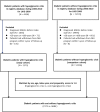Association between hyperglycaemic crisis and long-term major adverse cardiovascular events: a nationwide population-based, propensity score-matched, cohort study
- PMID: 27554106
- PMCID: PMC5013487
- DOI: 10.1136/bmjopen-2016-012233
Association between hyperglycaemic crisis and long-term major adverse cardiovascular events: a nationwide population-based, propensity score-matched, cohort study
Erratum in
-
Correction: Association between hyperglycaemic crisis and long-term major adverse cardiovascular events: a nationwide population-based, propensity score-matched, cohort study.BMJ Open. 2016 Sep 9;6(9):e012233corr1. doi: 10.1136/bmjopen-2016-012233corr1. BMJ Open. 2016. PMID: 27612541 Free PMC article. No abstract available.
Abstract
Objective: Hyperglycaemic crisis was associated with significant intrahospital morbidity and mortality. However, the association between hyperglycaemic crisis and long-term cardiovascular outcomes remained unknown. This study aimed to investigate the association between hyperglycaemic crisis and subsequent long-term major adverse cardiovascular events (MACEs).
Participants and methods: This population-based cohort study was conducted using data from Taiwan's National Health Insurance Research Database for the period of 1996-2012. A total of 2171 diabetic patients with hyperglycaemic crisis fit the inclusion criteria. Propensity score matching was used to match the baseline characteristics of the study cohort to construct a comparison cohort which comprised 8684 diabetic patients without hyperglycaemic crisis. The risk of long-term MACEs was compared between the two cohorts.
Results: Six hundred and seventy-six MACEs occurred in the study cohort and the event rate was higher than that in the comparison cohort (31.1% vs 24.1%, p<0.001). Patients with hyperglycaemic crisis were associated with a higher risk of long-term MACEs even after adjusting for all baseline characteristics and medications (adjusted HR=1.76, 95% CI 1.62 to 1.92, p<0.001). Acute myocardial infarction had the highest adjusted HR (adjusted HR=2.19, 95% CI 1.75 to 2.75, p<0.001) in the four types of MACEs, followed by congestive heart failure (adjusted HR=1.97, 95% CI 1.70 to 2.28, p<0.001). Younger patients with hyperglycaemic crisis had a higher risk of MACEs than older patients (adjusted HR=2.69 for patients aged 20-39 years vs adjusted HR=1.58 for patients aged >65 years).
Conclusions: Hyperglycaemic crisis was significantly associated with long-term MACEs, especially in the young population. Further prospective longitudinal study should be conducted for validation.
Keywords: diabetic ketoacidosis; hyperglycemic crisis; hyperglycemic hyperosmolar status; major adverse cardiovascular event.
Published by the BMJ Publishing Group Limited. For permission to use (where not already granted under a licence) please go to http://www.bmj.com/company/products-services/rights-and-licensing/
Figures



References
Publication types
MeSH terms
LinkOut - more resources
Full Text Sources
Other Literature Sources
Medical
